Subscribe to Blog via Email
Join 2,095 other subscribers
Subscribe to Blog via Email
Join 2,095 other subscribers
|
It has been ages since my last blog post. I promise to correct this lull with more frequent blog posts from now on!
I’ve been very busy with the i-deel team at UNSW and also just got back from a wonderful trip to visit Tobias Uller and the Uller lab at Lund University. It was an absolutely fantastic trip, filled with loads of science discussion and productive work towards a paper Tobias, Shinichi and I have been planning.
The Uller lab is growing fast and there are all kinds of cool and exciting projects happening from Anole (Anolis) lizards to Daphnia to good old Wall Lizards (Podarcis). Of course, I got a chance to enjoy the sights on my way to work every day and even visited Southern France for a few days to help with some field work and give a talk at the CNRS in Moulis. It was great to catch up with Fabien Aubret again too!
Some pictures from my adventures below!
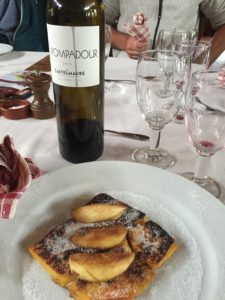 My favourite…French wine and dessert! 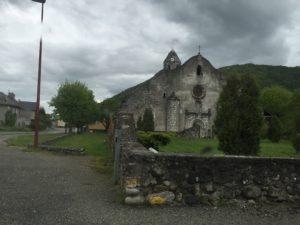 A crazy old church in France! 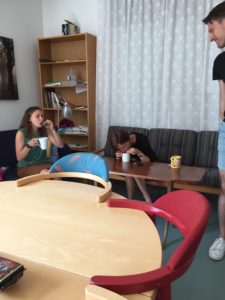 Members of the Uller lab doing some Tim Tam Slams!  Beautiful buildings and flowers in Lund Facebook, Twitter, Email SharingLike this:Like Loading...
It’s been a massive couple months for Fonti Kar, who has pulled off an amazing thesis. Congratulations! She remained cool, calm and collective right to the end and wrapped up her thesis with plenty of time to spare!
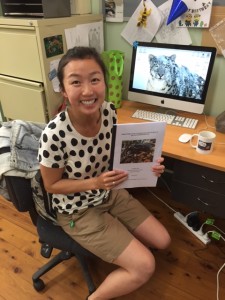
Fonti did two huge experiments that jived well together. Her first chapter explored the predictors of contest outcome in our favourite lizard, Eulamprus quoyii. This is one area we lack a lot of information on and Fonti has shown that there are some very interesting assessment stages that Eulamprus proceed through before escalating to fights. Actually, escalated fights that result in fighting and biting between two males only occurred in 38% of contest pairings. Interestingly, given the differences between escalated and non-escalated (i.e. contests resolved through signalling) contests, she predicted that the predictors of contest outcome should vary depending on these assessment stages. While most of her predicted traits did not affect contest outcome (which is interesting given she did 116 contests!), she did find a prior winning effect that influenced the probability of initiating a contest, which was a strong predictor of contest outcome (if you initiated you won!). In support of her prediction, she also showed that the importance of initiating a contest depended on whether the contest escalated or not. Males that initiated in non-escalated contests had a much higher probability of winning whereas it didn’t seem to make a difference if they decided to initiate a contest that resulted in physically fighting with another male.
Fonti’s second chapter made use of this huge contest experiment to look at the role of social dominance (whether you win against other males during a contest) on social information use. Making use of the contest data she paired males of known contest history together and randomly assigned one of these males (dominant or subordinate) to be the experimental lizard and the other was designated the demonstrator lizard. Dominant males were winners and subordinate lizards the losers of contests. The demonstrator was trained to flip lids to access a mealworm under a rewarded lid and was then allowed to show the experimental lizard this task. Importantly, we have shown that E. quoyii do use social information to learn such a task (click here to learn more about that work), but only young lizards used social information to learn. However, age and dominance often go hand in hand in lizards and so Fonti attempted to control for age by assigning equal numbers of large and small males across three treatment groups: 1) Where the dominant male was the demonstrator; 2) the subordinate male was the demonstrator and 3) a control group, which was a mix of dominant and subordinate experimental lizards that were just shown the other lizard but not doing the task. She specifically predicted that watching a male that was dominant or subordinate to yourself would affect how you use social information. In other words, subordinate male lizards would pay more close attention to those big macho males, while macho males wouldn’t care what some small little male was up to. Her results were interesting, but to make a long story short, social dominance didn’t seem to affect social information use in anyway and actually her results were similar to those found in previous work comparing old males – they didn’t seem to use social information at all! This is pretty cool because it suggests that age may really be the big driver of social information use for these particular tasks.
All this hard work required a massive celebration (a night out on the city) and a special trophy for Fonti to remind her of her lizard contests thanks to her fellow MSc friends (See below).
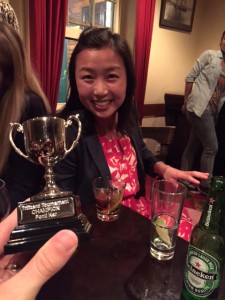
Facebook, Twitter, Email SharingLike this:Like Loading...
Come April I’ll be moving to the University of New South Wales (UNSW), Sydney, to take up an ARC funded DECRA Fellowship working in the new lab of A/Prof Shinichi Nakagawa. While it’s sad to be moving away from the LizardLab Martin will still be a big part of some very cool projects and I’ll still make regular visits. Shinichi, Martin, Scott Keogh (ANU) and I have big plans to conduct meta-analyses, develop individual-based models and start some very exciting empirical work on Garden skinks looking at how metabolism influences personality and learning. We’ll be testing some new and exciting theoretical developments in this area and we are looking for a bright, enthusiastic PhD student to be part of our team. If you’re interested in being part of the lab and working in a very exciting and dynamic place, such as UNSW, please shoot me an email! The details on the PhD advertisement are listed below:
PhD position studying lizard personality, learning and metabolism at the University of New South Wales
Dr. Daniel Noble and A/Professor Shinichi Nakagawa in the Evolution & Research Centre (E&ERC), at the University of New South Wales (UNSW) are seeking a highly motivated and enthusiastic student to study the covariation between metabolism, personality and learning in a model Australian lizard system. The student will join a newly formed lab group at UNSW and be part of an exciting multidisciplinary team building links between environmentally driven effects on phenotypic variation and the consequences of these effects on fitness. The student will combine theory with extensive experimental work manipulating incubation temperatures, taking behavioural and physiological measures, and establishing controlled semi-natural breeding experiments to obtain multigenerational data. They will use cutting edge molecular (e.g. SNP genotyping) and statistical tools (e.g. meta-analysis, Bayesian and individual-based modeling) during their candidature to address important topical questions in evolutionary and behavioural ecology. The student will also work with collaborators from Macquarie University, Sydney University, and The Australian National University in addition to other research groups at UNSW. We expect the student to travel to both international and national conferences to present the results of their work during their candidature.
If you are interested in joining our exciting project at E&ERC, UNSW please send an email with an expression of interest, why you are interested in joining the lab and your CV to Dan (daniel.wa.noble@gmail.com) and Shinichi (s.nakagawa@unsw.edu.au). High quality applicants will apply for an APA scholarship through UNSW, which covers tuition and provides a stipend ($25,392/year; more details at: https://research.unsw.edu.au/domestic-research-candidate-scholarships). Opportunities exist to make additional income through teaching positions advertised in the department.
Note that to apply for an APA scholarship, the candidate needs to be Australian or New Zealand citizen or permanent resident. However, we welcome students who would like to bring their own scholarship to join our project.
Facebook, Twitter, Email SharingLike this:Like Loading...
|
|






